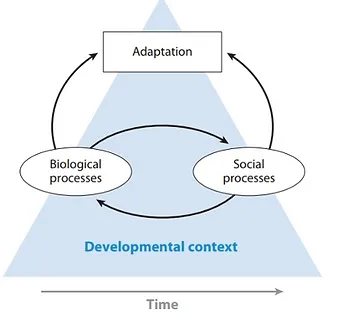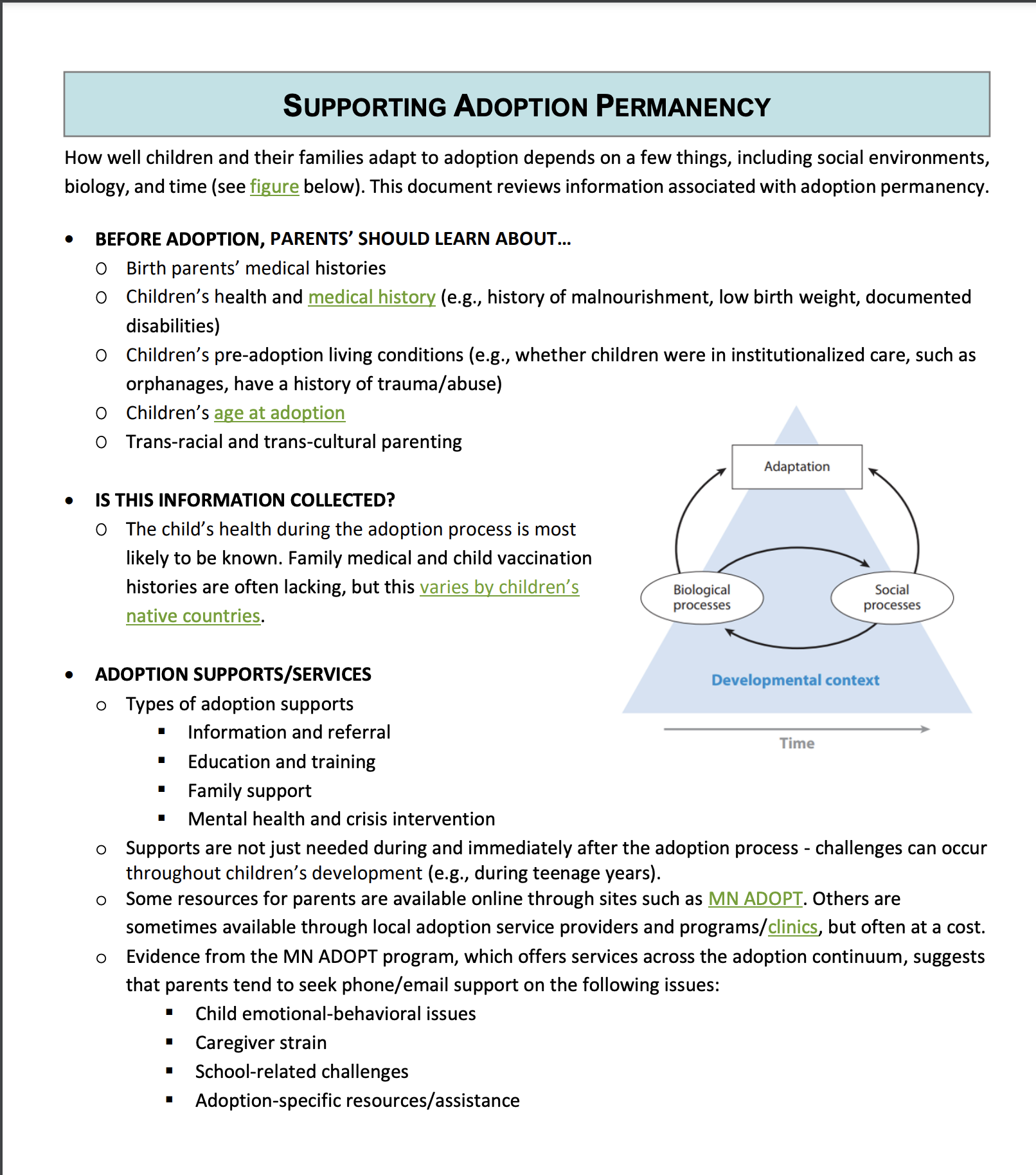
How well children and their families adapt to adoption depends on a few things, including social environments, biology, and time (see figure below).This document reviews information associated with adoption permanency.

Before adoption, parents’ should learn about…
- Birth parents’ medical histories
- Children’s health and medical history (e.g., history of malnourishment, low birth weight, documented disabilities)
- Children’s pre-adoption living conditions (e.g., whether children were in institutionalized care, such as orphanages, have a history of trauma/abuse)
- Children’s age at adoption
- Trans-racial and trans-cultural parenting
Is this information collected?
The child’s health during the adoption process is most likely to be known. Family medical and child vaccination histories are often lacking, but this varies by children’s native countries.
Adoption Supports/Services
- Types of adoption supports
- Information and referral
- Education and training
- Family support
- Mental health and crisis intervention
- Supports are not just needed during and immediately after the adoption process – challenges can occur throughout children’s development (e.g., during teenage years).
- Some resources for parents are available online through sites such as MN ADOPT. Others are sometimes available through local adoption service providers and programs/clinics, but often at a cost.
- Evidence from the MN ADOPT program, which offers services across the adoption continuum, suggests that parents tend to seek phone/email support on the following issues:
- Child emotional-behavioral issues
- Caregiver strain
- School-related challenges
- Adoption-specific resources/assistance
The Research-to-Policy Collaboration (RPC) works to bring together research professionals and public officials to support evidence-based policy. Please visit their website to learn more.
Key Information
RPC Website
Research-to-Policy Collaboration
Publication DateJuly 25, 2019
Topic Area(s)Social Services
Resource TypeWritten Briefs
Share This Page
How well children and their families adapt to adoption depends on a few things, including social environments, biology, and time (see figure below).This document reviews information associated with adoption permanency.

Before adoption, parents’ should learn about…
- Birth parents’ medical histories
- Children’s health and medical history (e.g., history of malnourishment, low birth weight, documented disabilities)
- Children’s pre-adoption living conditions (e.g., whether children were in institutionalized care, such as orphanages, have a history of trauma/abuse)
- Children’s age at adoption
- Trans-racial and trans-cultural parenting
Is this information collected?
The child’s health during the adoption process is most likely to be known. Family medical and child vaccination histories are often lacking, but this varies by children’s native countries.
Adoption Supports/Services
- Types of adoption supports
- Information and referral
- Education and training
- Family support
- Mental health and crisis intervention
- Supports are not just needed during and immediately after the adoption process – challenges can occur throughout children’s development (e.g., during teenage years).
- Some resources for parents are available online through sites such as MN ADOPT. Others are sometimes available through local adoption service providers and programs/clinics, but often at a cost.
- Evidence from the MN ADOPT program, which offers services across the adoption continuum, suggests that parents tend to seek phone/email support on the following issues:
- Child emotional-behavioral issues
- Caregiver strain
- School-related challenges
- Adoption-specific resources/assistance
The Research-to-Policy Collaboration (RPC) works to bring together research professionals and public officials to support evidence-based policy. Please visit their website to learn more.

Key Information
RPC Website
Research-to-Policy Collaboration
Publication DateJuly 25, 2019
Topic Area(s)Social Services
Resource TypeWritten Briefs
Share This Page
LET’S STAY IN TOUCH
Join the Evidence-to-Impact Mailing List
Keep up to date with the latest resources, events, and news from the EIC.




